- Home
- David Lubar
Sophomores and Other Oxymorons Page 10
Sophomores and Other Oxymorons Read online
Page 10
“Get us something great for next time,” Sarah said to me as the meeting ended.
“Such as . . . ?” I asked.
“Totally up to you,” she said. “See what you can come up with.”
“Thanks.” As I walked off, the words up with resonated in my mind, reminding me of a famous quote. As I savored that quote, I knew exactly the sort of opinion piece I could come up with. “A smile crossed my lips, revealing my teeth,” Scott said, transcendentally. This was going to be awesome.
TWELVE
Saturday afternoon, Wesley pulled up in the bagel truck.
“Where’s your car?” I asked.
“Home.”
“Did it break down?”
“Nope.”
“So why are you using this?” I asked.
“It has gas,” he said.
For as long as I’d known Wesley, he’d seemed to have a thing against paying for his own gas. Or lunch. At least I’d pretty much managed to convince him that it was wrong to steal gas from other people. Or lunch money. Though I guessed he was sort of stealing it now, except not from strangers.
“Not your gas,” I said.
“It’s okay. My boss wanted me to make a delivery.” He pointed over his shoulder to a half-dozen boxes on the floor.
“Is it legal?” I asked.
“It’s bagels,” Wesley said. “He donates the leftovers to the food bank down off Division Street.”
I thought about my last experience with surplus bagels. “They haven’t spilled out, have they?”
“Nope. Not yet. They came close a couple times.”
Wesley drove. I sat in back and kept the boxes from tipping over. Then, when we got there, I helped him bring everything in.
“That’s cool,” I said when we were finished. “It feels good to help people.”
Wesley glanced back at the food bank, then smiled. “Yeah. It does.”
I looked at the empty area of the truck, and thought about all the bagels Wesley must have delivered. He’d put in a long day. “Do you miss school?”
“Some of it,” Wesley said.
“Seriously?”
“Yeah. The routine is nice. You always know where you’re supposed to be, and you know when you’re supposed to be there.”
“But you cut class all the time,” I said.
“You’re right.” His eyes clouded over with a look of nostalgia. Then he nodded. “Breaking the routine is sort of nice, too.”
• • •
Tuesday, the first issue of the paper for the school year came out. One of my favorite things was seeing kids carrying a copy with their books, or even stopping to read an article when a headline caught their eye. The teachers give out copies in homeroom, but there’s also a Zenger Gazette box by the front office, so visitors can grab one.
I stopped by the box on my way in, to check out the front page. Everything looked great. We’d led with a story about the budget.
“Good start,” Mr. Franka said, walking up behind me.
“Thanks.” I pointed to the box. “It’s a good feeling.”
“I’m glad you’re keeping Tom Swifties alive,” he said.
“Me, too. Hey, were you on the paper when you were in high school?”
“I wanted to be. But my grades weren’t very good.”
“Seriously?”
“Dead seriously.”
“That’s hard to imagine,” I said.
“Not everyone shows up at the front door equipped for an easy trip,” he said. “I had to learn how to learn. I did have several teachers who tried pretty hard to get some knowledge through my thick skull. That made a difference.”
“Is that why you teach now?” I asked.
“That’s part of it, I guess. But you can’t really boil down big decisions in life into simple explanations, like we’re fictional characters in one-dimensional novels.”
“I guess not.” I thought about some of my own decisions. Most of them were based more on whim and chance than inspiration.
When I got to homeroom, I was pleased to see that most of the kids were reading the paper. I even heard some of them discussing the Zenger Zinger. I was tempted to toss out cryptic hints, like It will take you forever to find the answer. But I decided not to do that.
Zenger Zinger for September 16
Find the missing word. The solution will appear next week.
“I love how cats respond to stroking,” John Peter said _________.
We were all pretty jazzed at the meeting on Wednesday. The paper had gotten a lot of good reactions. Kids were even trying to trick staff members into revealing the solution to the Zinger, or to Jeremy’s crossword.
“Let’s not rest on our laurels,” Sarah said. “We need to keep up the quality.”
“We will,” Jeremy said.
“I’ve got something this time,” I said. “It’s an opinion piece.”
“On what?” Sarah asked.
“The unfairness of pedantic and arbitrary rules,” I said.
Sarah frowned. “Scott, this is a high school paper, not a college symposium.”
“No worries,” I said, waving a hand to dismiss the objection. “It’s written in a very conversational style.”
“I’ll look forward to reading it,” Sarah said.
September 17
Check out this legendary sentence, Sean. I should explain it first. When someone mentioned that you can’t end a sentence with a preposition, this guy Winston Churchill, who was prime minister of the United Kingdom, super smart, and super sarcastic, replied, “That is the sort of errant pedantry up with which I will not put.” That’s such a brilliant comeback. Putting aside the vocabulary-busting phrase “errant pedantry,” which just means “misguided, stupid, nitpicking,” Churchill knocks it out of the park with an example of how awkward it is to follow that rule. Any normal person would say, “That’s the sort of thing I wouldn’t put up with.” Anyhow, I opened my essay with that quote, and then explained how the “rule” got into grammar books. It’s a killer essay. I totally demolish the stupid rules in the handbook. This is going to be awesome. I can’t wait to see it in the paper.
THIRTEEN
Mr. Franka popped his head into study hall, pointed at me, and said to the teacher, “I need to borrow him for a moment.”
I got out of my seat and followed Mr. Franka into the hall. “What’s up?” I asked.
“I read your essay.”
I was pleased he’d gotten to it already. “It’s pretty good, isn’t it?”
“It’s well written . . .”
“But . . . ?”
“You’re taking a shot at Mrs. Gilroy.”
“I never mention her name,” I said.
“You make it obvious enough.”
“You aren’t going to tell me we can’t run it, are you?” I felt a surge of heat invade my cheeks at the thought of being censored.
“Never.” He touched the Marine Corps tattoo on his arm. “A lot of people made large sacrifices for your freedom to speak your mind.”
“So, why are you here?” I asked.
“To urge you to think carefully before you commit to publishing this. I understand why you wrote it. I understand how you feel. I know you believe those rules are arbitrary. Some scholars agree with you. Others don’t.”
“What about you?” I asked.
“I generally don’t enforce them. But they’re widely entrenched. When enough people accept a rule, its origin doesn’t matter. That’s how the academic world works. Students need to know these rules. It doesn’t hurt to practice them. I respect Mrs. Gilroy’s insistence on having her students learn and follow them. I respect her expertise. But that’s beside the point. Look, I’m not saying we won’t ever run the piece. I’m asking you to let it sit for a week or two. Gi
ve yourself a chance to think calmly about everything you wrote. Are you okay with that?”
I thought about the fantasies I already had of the student reaction. Kids would cheer for me as I walked down the halls. They’d rip up writing guides and shower me with confetti. “I was kind of looking forward to getting it in print,” I said.
“Of course you were. We write to be read. But I know from experience that the angrier the article, the more time you should take before the point of no return. You should give yourself a bit of time to think this through. Would you do that as a favor to me?”
I didn’t like the idea. There was no reason to wait. I was positive my opinion wasn’t going to change. But he was the best teacher I’d ever had, and he’d given me a lot of breaks. “Sure. Why not? I’ll hold off.”
He clasped my shoulder. “Thanks, Scott. It’s a smart move. I appreciate it. If the paper gets killed by the voters, you can save the piece for the last issue, and really go out with a bang.”
“I hope it doesn’t come to that,” I said.
“That makes two of us.”
I let Sarah know I was holding back the essay. So, once again, I would have nothing in the paper. But it was still early in the year. I’d rather take my time and write a great article than rush stuff into print for the sake of being in every issue.
• • •
On Friday in history, Ms. Burke smiled at me when she handed back my essay.
“Good job,” she said.
“Thanks.” This had been our first written assignment, and I’d put a lot of time into doing a good job. I stared at the grade. Not only had she given me a hundred, she’d written, “I love your writing.”
Wow. I like to think I’m good. But this seemed a bit over the top. I guessed I should be happy I impressed her.
• • •
Sunday, after lunch, I kept thinking about the jerks who had invaded my life. I wasn’t sure how they ranked, as far as claiming the trophy for who was the worst, but I knew I’d be a lot happier without Ms. Denton and Mrs. Gilroy around. I’d finished the rest of my homework, but I still needed my figure-of-speech paragraph. I was scanning the list in my notebook when I spotted the one I couldn’t believe was an actual word. Bdelgymia. Seriously, do people need to make everything harder by giving impossible names to stuff?
When I looked up bdelgymia, I discovered it would give me a chance to write the perfect paragraph for my present mood, and fill the vengeance void I’d created when I’d agreed to hold back my newspaper essay.
Sweet.
All bdelgymia meant was a spewing of hatred. I grinned at the idea of having permission to do that. Still, why couldn’t they give it a cool name like hatespew or wordsword? Oh, I liked that second one, especially since people might not notice the “sword” part at first. If I ever got made Emperor of English, I’d definitely change all the names to make them more fun.
Zenger Zinger for September 23
Last week’s answer: “I love how cats respond to stroking,” John Peter said perpetually.
This week’s puzzle: “I like to make rhymes when I’m underwater,” John Peter said _________.
Mrs. Gilroy didn’t pull my paragraph from the pile until Thurs-day. It had been preceded by a sea of unexceptional antistrophes, mundane distinctios, a clueless haiku from someone who clearly misunderstood the assignment, and a clever psittacism that I knew was Lee’s. Clever Lee. Yes, Lee is clever. Lee is very clever.
As soon as I heard the first sentence of my paragraph, I poked Lee in the arm and shot her a grin.
I have to give Mrs. Gilroy credit for reading my whole glorious and venomous hatespew without blinking. I loved the way the class, which started out only half-listening, gave her their full attention by the last sentence. This was great. When Mrs. Gilroy was finished, I waited for her reaction. To my surprise, she didn’t say anything. Instead, she went to the board and wrote out my paragraph.
The English teacher was one of those harpy-like harridans who is always sure she is right, even when she is pathetically wrong. Happy to constantly flout her arrogance, she wrings every shred of pleasure from the study of the English language. Her horrible personality is matched only by her dreadful sense of style.
After quickly determining that none of my classmates recognized the figure of speech, Mrs. Gilroy said, “I’m not sure where to start. There are so many errors.”
Her words hit me like a punch to the gut. Errors?
She tapped harridans, and said, “Plural subject.” Then, she tapped the “is” that followed it and said, “Singular verb. This is a very common mistake, but that’s still no excuse. Anyone with a true ear for the language would never do this. Let’s move on.”
I stared at the first sentence. Damn. I saw what she meant. It should have been “one of THOSE HARRIDANS who ARE always sure.”
My smackdown had just begun. Mrs. Gilroy tapped flout. “Class?”
A half dozen hands went up. Oh, crap. I meant flaunt. I always get those mixed up.
Sticking with the same sentence, she tapped constantly. “I’m not even going to ask who knows this. You’re all aware you shouldn’t split infinitives.”
This was another debatable rule. Before I could even get suitably annoyed about that, she grabbed the chalk and circled wring every shred.
Now what? That was a perfectly fine phrase.
Hands went up. Knitting needles entered my gut and colon.
“Mixed metaphor,” Julia said. “You wring liquids from things, not shreds.”
Mrs. Gilroy smiled at her like she’d just written a sequel to Hamlet.
“As for the last sentence,” Mrs. Gilroy said, “amazingly, it is not peppered with errors. I suppose anyone can get the words right once in a while, although these tepid attempts don’t rise to the caustic level one would expect from a well-crafted example of bdelgymia. I won’t embarrass the author of this thin gruel by naming him. All of you should view this as a wonderful example of how not to write bdelgymia, or anything else, for that matter.”
Lee was nice enough to treat me to French fries after school. It didn’t help. Or they didn’t help. Or that didn’t help. I’m not really sure. One of those. Pick whichever sounds right. Or sound right. Or sound rightly. I, apparently, have no ear for prose.
• • •
I licked my wounds that night. Most of Friday slipped by pretty quickly. Mrs. Gilroy and Ms. Denton crushed my spirits in various nonlethal ways, and I still had nothing for the next paper, which came out on the last day of the month. But everything else was fine.
That afternoon, Danny had a new book. Before I could even ask, he held it up.
“Stotan!?” I asked. The author’s name seemed familiar, but I was pretty sure I hadn’t read any of his books. “What’s that mean?”
He shrugged. “I haven’t started reading it yet.”
I held my hand out, and he passed the book to me. I read the back. It sounded good. And it explained what a Stotan was. We’d just started reading Cyrano de Bergerac in English. It was sort of cool in its own way, and there was a lot of wordplay, along with sword play, and a healthy dose of wordswords, but it’s not something I would have picked for myself if I’d had a choice.
I handed the book back to Danny. “Let me know how it is.”
“Sure.”
It bugged me that Danny was reading a book I’d never read, so I swung by the library at the end of the day. They had a copy.
“Good choice,” the librarian, Ms. Paige—really, that’s her name—said when I checked it out. “It does contain some adult language. Are your parents okay with that?”
“My father’s a mechanic,” I said. “Have you ever hit your thumb with a wrench?”
“Got it,” she said. “Enjoy the book. If you like it, he’s written others that are equally good.”
“And equally
inappropriate?” I asked.
“You bet.” She punctuated that with a wink. Librarians rock.
“Thanks.” I tucked the book in my backpack. I was always up for discovering a new author. And Ms. Paige was pretty good at gauging my tastes. Last year, she’d introduced me to Stephen Gould and Peter S. Beagle.
As I headed out at the end of the day, I realized I was close to surviving my first sophomoric month. And Jeremy was almost finished with his first freshmaniacal one.
“Here’s hoping next month is uneventful,” I said as we took our seats on the bus.
“I’ve been hoping for that every month since I started kindergarten,” he said. “So far, no luck.”
Zenger Zinger for September 30
Last week’s answer: “I like to make rhymes when I’m underwater,” John Peter said subversively.
This week’s puzzle: “The tomb is filled with blood-sucking insects,” John Peter said _________.
FOURTEEN
When I took my seat in geometry next Wednesday, Lee handed me a package neatly wrapped in newspaper. “Here.”
I was amused to note she’d selected the sports section. “Thank you for not using the obituaries.”
“Too obvious.”
“What is it?”
“Open it,” she said.
It felt like a book. I ran a finger under the spot where the paper overlapped, and lifted the tape. It was a book. “The Humor of Edgar Allan Poe,” I said, reading the title. “Humor?”
Lee grinned. “He was a bundle of laughs. You’ll see.”
“Cool. But why are you giving me a present?” I asked.
“You’ll figure it out,” she said.
I had no idea whatsoever. All day, Lee kept throwing meaningful, expectant glances in my direction. I remained clueless. On the bright side, it did give me an idea for the next newspaper puzzle. The staff loved the Zinger when I revealed it at the meeting.
That night, as I was drifting off to sleep, an image floated up from my mind. One year ago, on October 1, Lee had walked into homeroom. She was wearing a shirt with a decapitated teddy bear on it. One year ago. Exactly one year. Today was the anniversary of Lee’s arrival at Zenger, and of the day we met. That’s why she’d given me a present. And that’s why she kept staring at me all day, like she expected me to do something. I never would have guessed Lee cared about anniversaries.

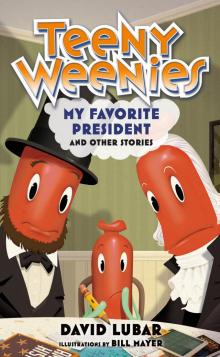 Teeny Weenies: My Favorite President
Teeny Weenies: My Favorite President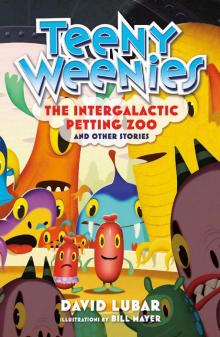 Teeny Weenies: The Intergalactic Petting Zoo
Teeny Weenies: The Intergalactic Petting Zoo Teeny Weenies: The Eighth Octopus
Teeny Weenies: The Eighth Octopus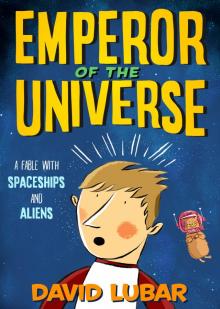 Emperor of the Universe
Emperor of the Universe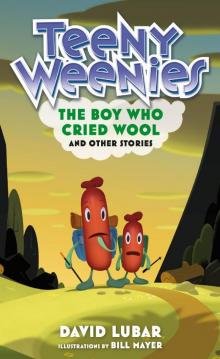 Teeny Weenies: The Boy Who Cried Wool
Teeny Weenies: The Boy Who Cried Wool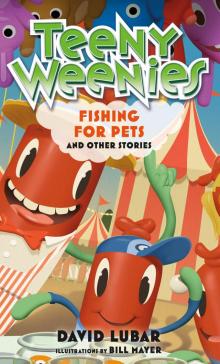 Teeny Weenies: Fishing for Pets
Teeny Weenies: Fishing for Pets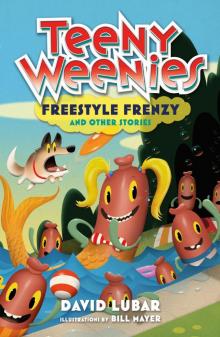 Teeny Weenies: Freestyle Frenzy
Teeny Weenies: Freestyle Frenzy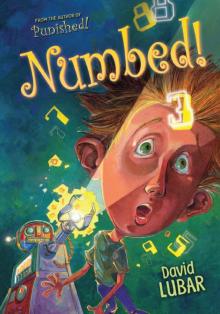 Numbed!
Numbed!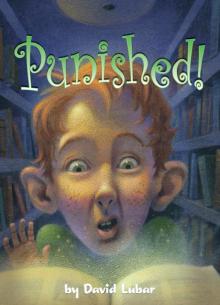 Punished!
Punished!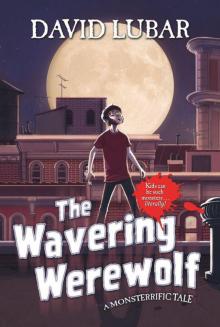 The Wavering Werewolf: A Monsterrific Tale (Monsterrific Tales)
The Wavering Werewolf: A Monsterrific Tale (Monsterrific Tales) Dog Days
Dog Days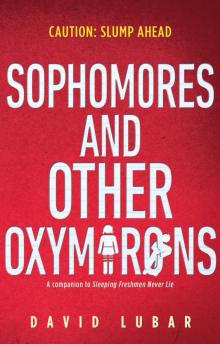 Sophomores and Other Oxymorons
Sophomores and Other Oxymorons The Psychozone
The Psychozone My Rotten Life
My Rotten Life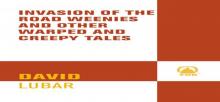 Invasion of the Road Weenies
Invasion of the Road Weenies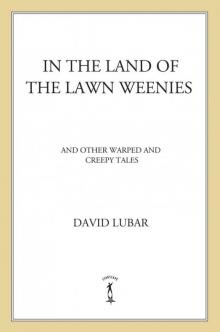 In the Land of the Lawn Weenies
In the Land of the Lawn Weenies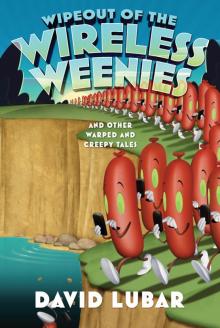 Wipeout of the Wireless Weenies
Wipeout of the Wireless Weenies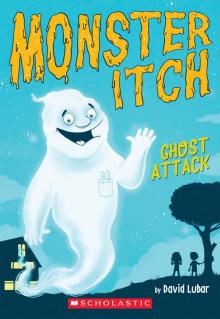 Ghost Attack
Ghost Attack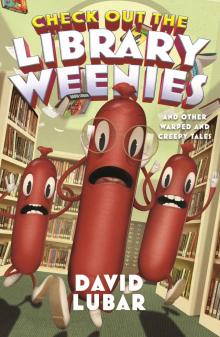 Check Out the Library Weenies
Check Out the Library Weenies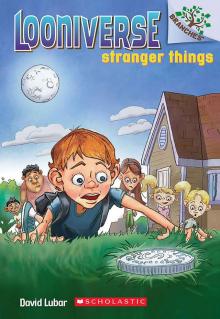 Looniverse #1: Stranger Things (A Branches Book)
Looniverse #1: Stranger Things (A Branches Book)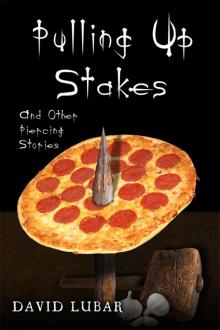 Pulling up Stakes and Other Piercing Stories
Pulling up Stakes and Other Piercing Stories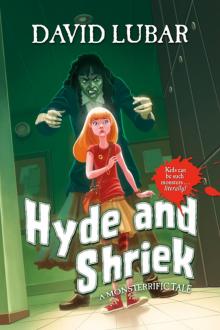 Hyde and Shriek
Hyde and Shriek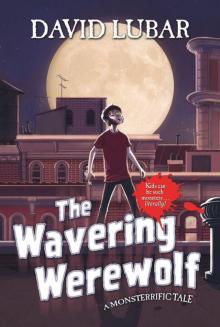 The Wavering Werewolf
The Wavering Werewolf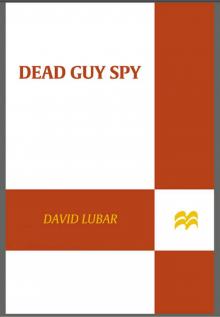 Dead Guy Spy
Dead Guy Spy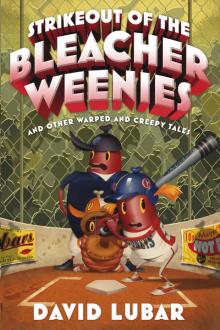 Strikeout of the Bleacher Weenies
Strikeout of the Bleacher Weenies The Big Stink
The Big Stink The Battle of the Red Hot Pepper Weenies
The Battle of the Red Hot Pepper Weenies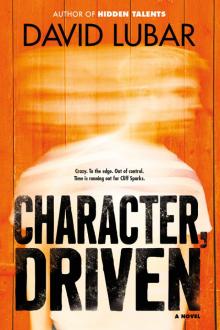 Character, Driven
Character, Driven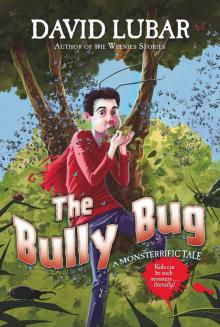 The Bully Bug
The Bully Bug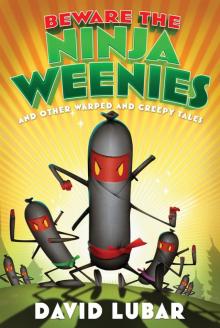 Beware the Ninja Weenies
Beware the Ninja Weenies Extremities: Stories of Death, Murder, and Revenge
Extremities: Stories of Death, Murder, and Revenge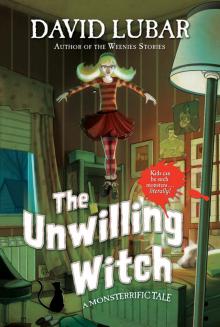 The Unwilling Witch
The Unwilling Witch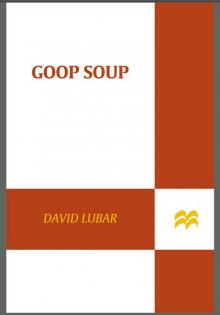 Goop Soup
Goop Soup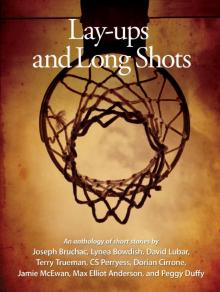 Lay-ups and Long Shots
Lay-ups and Long Shots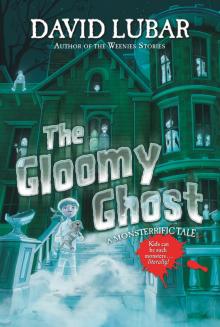 The Gloomy Ghost
The Gloomy Ghost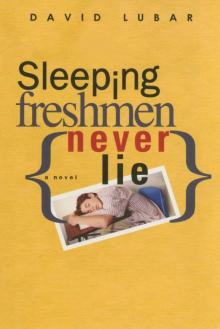 Sleeping Freshmen Never Lie
Sleeping Freshmen Never Lie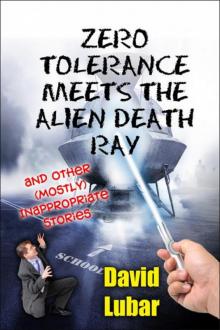 Zero Tolerance Meets the Alien Death Ray and Other (Mostly) Inappropriate Stories
Zero Tolerance Meets the Alien Death Ray and Other (Mostly) Inappropriate Stories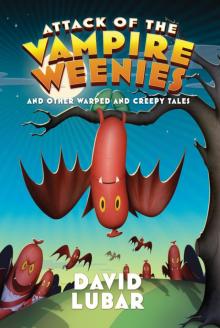 Attack of the Vampire Weenies
Attack of the Vampire Weenies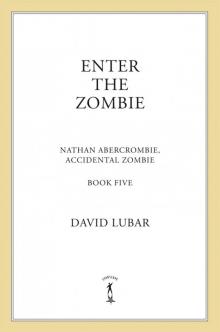 Enter the Zombie
Enter the Zombie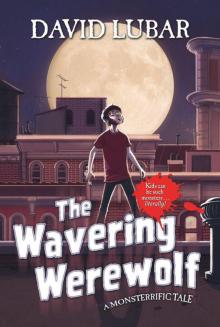 The Wavering Werewolf_A Monsterrific Tale
The Wavering Werewolf_A Monsterrific Tale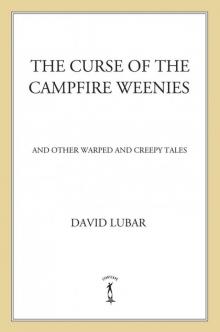 The Curse of the Campfire Weenies
The Curse of the Campfire Weenies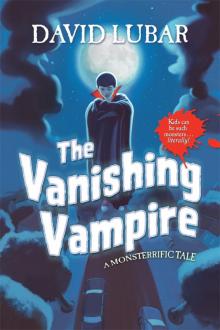 The Vanishing Vampire
The Vanishing Vampire